The 'new' snack bars
The traditionally 'members only' bars are becoming more liberal
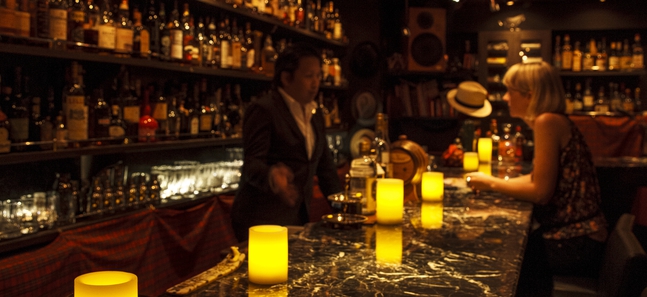
Bar C-Shell
Posted: Tue Dec 23 2014
Stroll around Arakicho by day and you wouldn’t guess that, as night falls, its interconnected lanes and alleyways turn into a kind of secret village of snack bars. I say ‘secret’ for two reasons – because these days Tokyo’s younger generation generally isn’t even aware of the nightlife that’s been going on here since the ’60s; and because gaining access to a snack bar is akin to belonging to an exclusive members’ club – you have to be invited by someone already on the inside. This is referred to as the ichigen-san (first-time customer) system and is essentially designed to ensure the existing clientele is not scared off by rowdy bar hoppers, and to maintain the feeling of familiarity you get at this particular kind of establishment.
If you’re an ichigen-san, best thing to do is befriend someone in the area and politely ask them to introduce you to their local haunt. Alternatively, if you’re brave enough, you could tentatively open the door and try saying, ‘Gomen kudasai. Sumimasen, ojamashite ii desu ka’ (‘Sorry to disturb you, mind if I join you?’). Traditionally, the snack bar is owned by a ‘mama’ – meaning, a homely woman who is on hand for friendly chatter and to serve you food she prepares behind the bar – or sometimes a ‘master’, the male version.
Arakicho currently has about 320 bars and eateries, I’m told by the owner of Bar C-Shell, Yu Makiura, who opened his place five years ago and so is considered a newcomer by the area’s older generation of snack bar owners. It’s a close-knit community here, he says, which has made it difficult for younger people like him to feel accepted. ‘However, in the time I’ve been here, at least 100 venues have changed, so I think the older generation is beginning to realise that we have to move with the times. How else are we going to continue to attract new customers?’ This is also the reason the ichi-gen concept is slowly losing traction with newer bars – in fact, none of the four places we visited operate like this, preferring to readily welcome new customers, including foreigners. And considering the area is just a hopskip from where the 2020 Tokyo Olympics is set to be held, they’re probably onto something.
Bar C-Shell
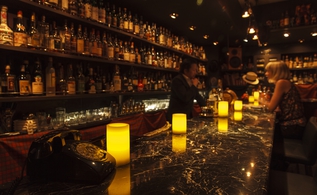
Underneath the name on the door sign, there are the words: ‘She sells sea shells on the sea shore’. Intrigued to know how this very English tongue twister found its way into the logo of a very Japanese cigar jazz bar, it’s my first question to owner and bartender Yu Makiura. ‘There are a few reasons,’ he says, ‘but mainly I wanted to emulate the way, in Japanese language, we tend to shorten phrases to more simplistic terms. “C-Shell” is my shortened version of the tongue twister. But the “C” is also meant to be a subtle reference to the fact that we sell cigars and cognac.’ I’m immediately taken by the great deal of thought Makiura has put into just the name of his bar, and it’s obvious from studying the décor in this elegant, moodily lit space that he has done the same with every other detail too. While C-Shell doesn’t operate on the ichi-gen concept, Makiura says he still wants to attract a certain standard of clientele; the type who enjoys slowly sipping on whisky and engaging in a more intellectual sort of conversation. So the door to his bar stays closed, and those who are curious enough to enter are usually quick to mellow out to the soft jazz tinkling in the background. Contact details and map
Deep
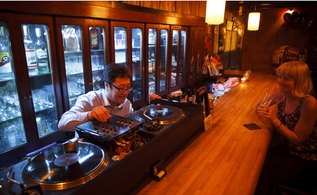
Before buying this casual drinking spot, Isao Samata was a regular customer here. He loved the relaxed, inviting vibe so much that when the previous owner decided to sell, Samata wasted no time in switching from a career in music production to serving drinks and spinning records. Deep operates on the one-coin system, meaning it’s ¥500 for table charge and another ¥500 for any drink – including even the most expensive whisky or gin in the house. There is nothing pretentious about this place and Samata keeps things friendly and upbeat with his easy chatter and extensive vinyl collection that’s stacked above the drinks cabinet. ‘Music connects people,’ he says from behind the decks as he reaches over to fade out the ’70s disco tune that’s playing before handing me a perfectly mixed tonic and lime on ice. As he drops the needle on the next record, I nod in agreement and say, ‘Ah, I do like a bit of ’90s Lenny Kravitz...’ Contact details and map
Lumiére
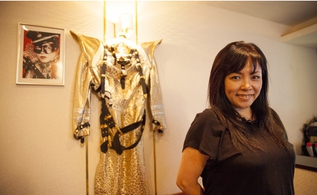
This is the only venue on our list that can truthfully be called a snack bar. The key features that make it so are the fact it’s run by a ‘mama’, Rumi Kazama, to whom you can chat while drinking shochu and eating cheese curry bread and spare ribs; and that there’s karaoke on offer for those who think they’ve got talent. This also means the cover charge is a little heftier at ¥3,000 but, in this case especially, perhaps it’s worth it to get the chance to meet the owner. Kazama, who is a bundle of cute, vivacious energy, was a successful Japanese pro-wrestling star in her younger years and as we sit down to chat on the red velvet chairs that line the bar’s back wall, she points out posters of herself from back in the day. Up on the wall are also two of her pro-wrestling costumes, which she says she sometimes even dons for her customers’ entertainment. She’s only owned Lumiére for a few months and says she hasn’t changed a thing from its original appearance (aside from the wrestling garb, of course). Since it’s hidden on the fourth floor of a nondescript building, this feels more like you’re entering someone’s living room than walking into a bar off the street. But that’s all part of the snack bar allure. Contact details and map
Kizuna Bar Lien
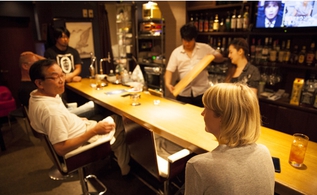
A more modern bar, Kizuna Bar Lien’s liveliness spills out onto the street, drawing in locals and foreigners alike. It’s light, bright and full of banter, with a snazzy, lipstick-red couch in the back corner just next to the karaoke monitor. On the evening we visit, there are two jovial guys at the bar, one of whom tells me in broken English that he often gets called the Japanese Jean Reno (he does actually look like the actor). He meets his friend at Kizuna Bar Lien every Monday night for an English lesson and the two of them enjoy the fun atmosphere here. Owner Yoshitomo Simohigashi, who used to be a mikoshi (portable shrine) carrier in traditional festivals, tells me he does experience some resistance from the older snack bar owners in the ’hood because ‘things can get quite noisy here’. But he agrees with Makiura, owner of Bar C-Shell, that things are changing – and need to change. Contact details and map
Tags:
Tweets
- About Us |
- Work for Time Out |
- Send us info |
- Advertising |
- Mobile edition |
- Terms & Conditions |
- Privacy policy |
- Contact Us
Copyright © 2014 Time Out Tokyo










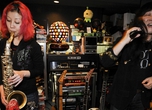
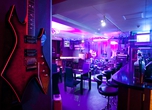
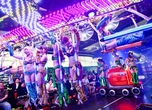
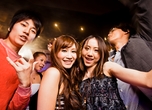
Add your comment